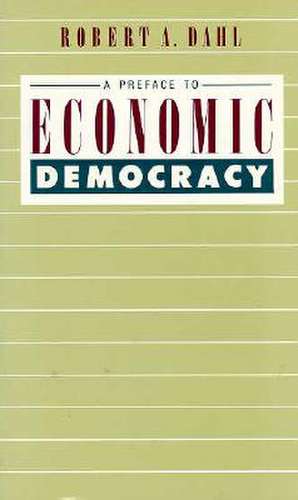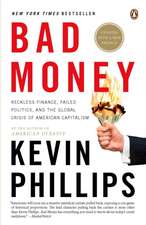Preface to Economic Democracy: Quantum Books
en Limba Engleză Hardback – 30 iun 1992
Arguing that Americans have misconceived the relation between democracy, private property, and the economic order, the author contends that we can achieve a society of real democracy and political equality without sacrificing liberty by extending democratic principles into the economic order. Although enterprise control by workers violates many conventional political and ideological assumptions of corporate capitalism as well as of state socialism. Dahl presents an empirically informed and philosophically acute defense of "workplace democracy." He argues, in the light of experiences here and abroad, that an economic system of worker-owned and worker-controlled enterprises could provide a much better foundation for democracy, political equality, and liberty than does our present system of corporate capitalism.
Din seria Quantum Books
-
 Preț: 145.57 lei
Preț: 145.57 lei -
 Preț: 182.32 lei
Preț: 182.32 lei -
 Preț: 414.05 lei
Preț: 414.05 lei -
 Preț: 302.67 lei
Preț: 302.67 lei -
 Preț: 303.64 lei
Preț: 303.64 lei -
 Preț: 302.45 lei
Preț: 302.45 lei -
 Preț: 304.58 lei
Preț: 304.58 lei -
 Preț: 306.90 lei
Preț: 306.90 lei -
 Preț: 302.45 lei
Preț: 302.45 lei -
 Preț: 302.67 lei
Preț: 302.67 lei -
 Preț: 301.53 lei
Preț: 301.53 lei -
 Preț: 302.67 lei
Preț: 302.67 lei -
 Preț: 183.25 lei
Preț: 183.25 lei -
 Preț: 301.31 lei
Preț: 301.31 lei -
 Preț: 301.53 lei
Preț: 301.53 lei -
 Preț: 304.96 lei
Preț: 304.96 lei -
 Preț: 301.53 lei
Preț: 301.53 lei - 23%
 Preț: 552.68 lei
Preț: 552.68 lei - 23%
 Preț: 549.71 lei
Preț: 549.71 lei - 23%
 Preț: 551.81 lei
Preț: 551.81 lei
Preț: 230.63 lei
Nou
44.13€ • 46.08$ • 36.44£
Carte tipărită la comandă
Livrare economică 15-29 aprilie
Specificații
ISBN-10: 0520058771
Pagini: 192
Dimensiuni: 126 x 201 x 12 mm
Greutate: 0.23 kg
Editura: University of California Press
Seria Quantum Books
Descriere
Tocqueville pessimistically predicted that liberty and equality would be incompatible ideas. Robert Dahl, author of the classic "A Preface to Democratic Theory, " explores this alleged conflict, particularly in modern American society where differences in ownership and control of corporate enterprises create inequalities in resources among Americans that in turn generate inequality among them as citizens.
Arguing that Americans have misconceived the relation between democracy, private property, and the economic order, the author contends that we can achieve a society of real democracy and political equality without sacrificing liberty by extending democratic principles into the economic order. Although enterprise control by workers violates many conventional political and ideological assumptions of corporate capitalism as well as of state socialism. Dahl presents an empirically informed and philosophically acute defense of "workplace democracy." He argues, in the light of experiences here and abroad, that an economic system of worker-owned and worker-controlled enterprises could provide a much better foundation for democracy, political equality, and liberty than does our present system of corporate capitalism.















